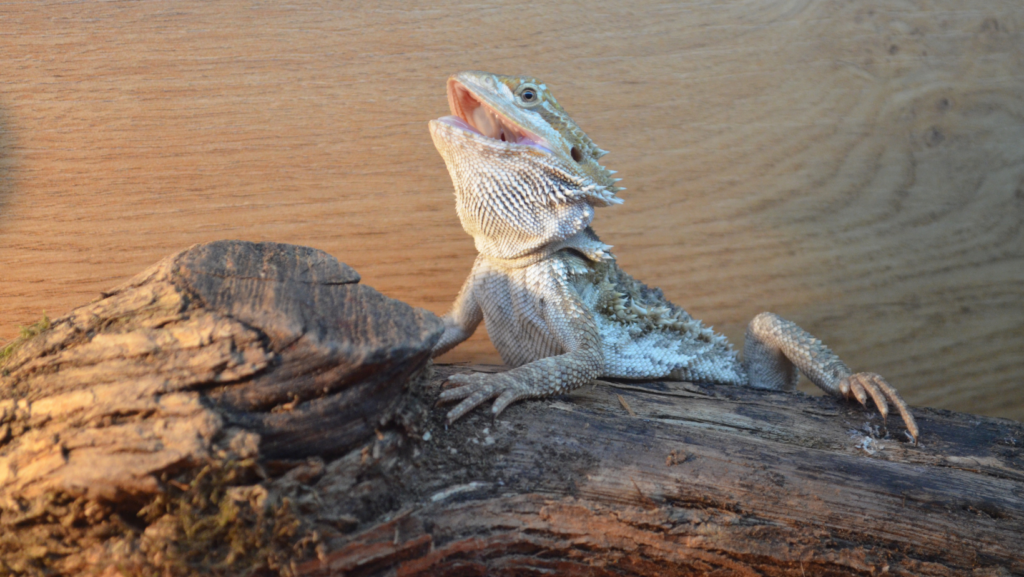Can bearded dragons cough? Technically, no, they cannot cough. Although you may be wondering if the noise your beardie is making is a cough and whether or not it’s cause for concern.
The nasal cavity of bearded dragons is home to salt glands that are responsible for absorbing fluid, which produces salt that can build up in the dragon’s throat.
When this happens, bearded dragons will sometimes try to clear the salt resulting in what may sound like a cough. There are a few other reasons why you may hear your pet making a cough-like noise.
Why is my Bearded Dragon Coughing?
One reason for a bearded dragon to sound like it is coughing is an upper respiratory infection. If a dragon has a respiratory infection it is important that it is seen by a veterinarian as soon as possible as the infection can be deadly.
Making a cough sound won’t be the only sign of a respiratory infection, other symptoms include difficulty breathing, gaping more than usual, mucus in the mouth and nostrils, weight loss, lowered appetite, and lethargy.
Regularly puffing up its throat and making sneezing sounds are also symptoms of a respiratory infection. Upper respiratory infections in bearded dragons often occur due to habitat. It is extremely important to gauge the humidity in your dragon’s cage with a hygrometer.
Humidity in the vivarium should stay between 30%- 40% while never going over 40%. Keeping a large water dish in the terrarium can be a culprit in high humidity.
Instead, it is better to provide water by misting the dragon. If you mist your pet you will need to clean the tank afterward in order to keep the area clean as well as monitor humidity levels.
Feeding your bearded dragons vegetables with high water content such as raw strawberries, watermelon, lettuce or cabbage is another great way to keep the reptile hydrated.
Giving your dragon baths or using a syringe to provide water are also good ways to hydrate your beardie. If you decide to place a water bowl inside the tank, be sure to use a small, shallow dish and remove it at certain times to keep the humidity from rising.
Preventing Bearded Dragon from Coughing

Keeping your reptile’s terrarium at the correct temperature is another important factor in maintaining your pet’s health. Bearded dragons require a warmer side and a cooler side in their cage.
For adults, the warm side should range from 90-93 degrees Fahrenheit with the cooler side between 80-90 degrees Fahrenheit. For dragons under 6 months old, the warm side needs to be 95-100 degrees Fahrenheit and 80-90 degrees Fahrenheit at the cooler end.
At night the cage temperature needs to be lowered to between 70-75 degrees Fahrenheit for both adults and juveniles.
If you have maintained the correct temperature and humidity levels in your dragon’s cage and don’t see other symptoms of a respiratory infection, there could be a different cause for your pet’s coughing noise.
Although it is always beneficial to reach out to your veterinarian for advice any time your pet is acting strangely. Another potential cause of the noise could be aspirating.
While this may sound bad, it is not uncommon for beardies to aspirate after drinking water or during a bath when they may swallow water.
Bearded dragons also occasionally aspirate after eating to remove pieces of food from their throat. Impaction can be another reason your bearded dragon is making a coughing sound.
If you’ve chosen the wrong substrate for your pet’s vivarium it is possible that it has been swallowed and is now causing an impaction. Some loose substances that are often used as substrates that can cause impaction are sand, walnut shells, artificial grass, mulch or bark, pebbles, and gravel.
Some of the best substrate alternatives are excavator clay, slate or ceramic tile, and reptile carpet. As with other reptiles, it is not possible for bearded dragons to cough like humans.
While you can’t prevent your dragon from aspirating on food or water, you can help keep your pet healthy. Maintaining cage cleanliness, as well as correct temperature and humidity are the best ways to prevent the cough-like sound. If your beardie is making a coughing noise it is always best to contact your veterinarian for more information.
Meet Madison Phillips, your compassionate guide to pet well-being. With experience from VCA Animal Hospitals and Laxton Vet Clinics Bellaire Inc. Madison honed her skills and embraced the balance of medical expertise and compassion, through her articles, she simplifies pet care, whether you’re a newbie or an experienced pet parent.

